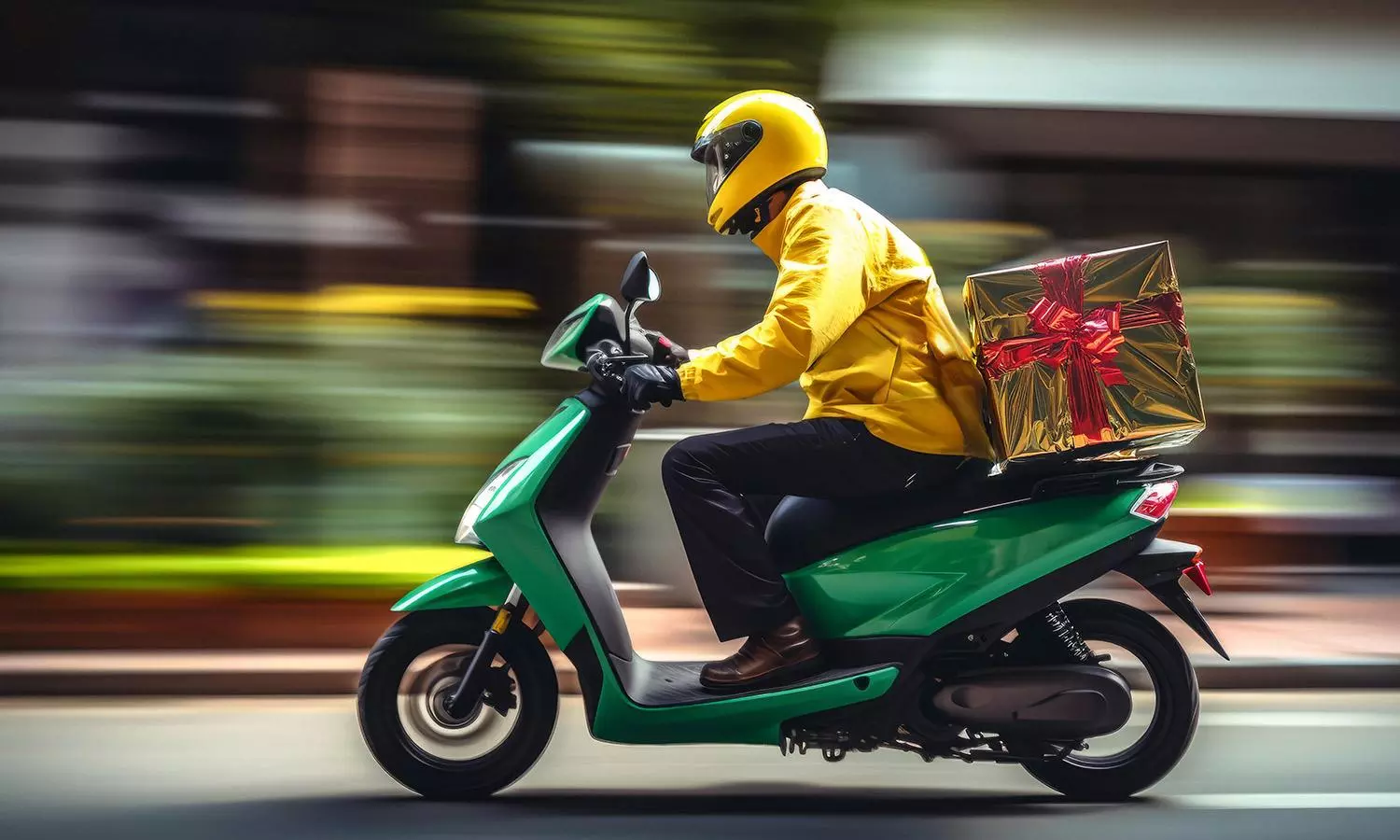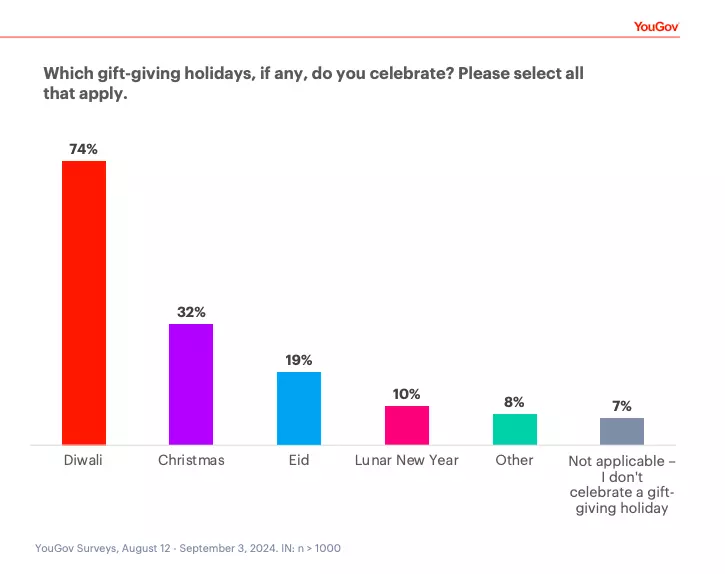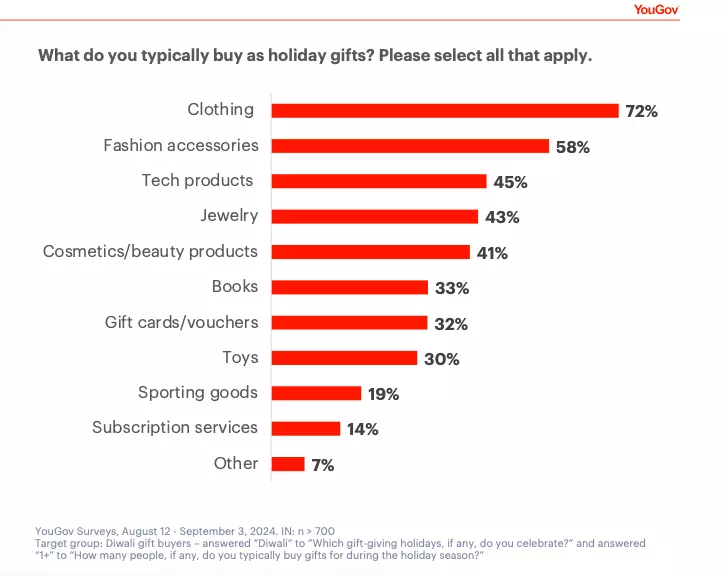How India is powering up for its largest festive gifting season
With 3 in 4 Indians celebrating diwali as a gift-giving holiday, India’s logistics sector gears up for the festive demand.

As India’s most celebrated festival, diwali continues to symbolise prosperity and joy, now entwined with a thriving culture of gift-giving and a rapidly expanding e-commerce landscape. According to YouGov’s Diwali Consumer Report for October 2024, almost 75% of diwali observers mark it as a gift-giving holiday, highlighting its cultural and economic significance. During this season, the logistics sector becomes a backbone for ensuring consumer satisfaction, especially with data indicating that e-commerce sales could reach a record-breaking $12 billion in 2024, up from $9.7 billion in 2023, according to Shiprocket, one of India’s leading e-commerce enablement platforms.

Rising consumer demand shaping diwali’s gifting landscape
The 2024 festive season has witnessed a surge in consumer demand across various sectors. Diwali gift buyers are primarily young, aged 25-34, predominantly male, and largely from North India. Apparel, tech products, and accessories remain the top gift categories, with 72% of diwali shoppers choosing clothing, followed by fashion accessories (58%) and tech items (48%) for gifting purposes.

Interestingly, 80% of consumers celebrating diwali have at least one gift plan to spend as much or more than last year, underlining both increased consumer confidence and disposable income. Influenced by a blend of traditional shopping practices and digital convenience, consumers are also buying gifts closer to the holiday, with 42% of shoppers making purchases one to four weeks ahead. Nearly 91% of these shoppers actively seek deals and promotions, reinforcing the importance of discounts in shaping buying behaviour during diwali.
For MSMEs, this trend is particularly advantageous. Saahil Goel, CEO of Shiprocket, remarks, “We are seeing a heightened consumer interest in diwali gifting, driven largely by affordable e-commerce solutions. Our role is to empower MSMEs to tap into this $12 billion market while ensuring seamless logistics support to help them meet surging demands.”

“Our role is to empower MSMEs to tap into this $12 billion market while ensuring seamless logistics support to help them meet surging demands.”Saahil Goel, Shiprocket.
Evolving e-commerce and logistics solutions for diwali shoppers
Shiprocket’s analysis indicates that festive e-commerce sales have been largely propelled by rising digital penetration, especially in Tier-2 and Tier-3 cities. Over 60% of online orders now come from non-metro areas, showing how improved internet access, disposable incomes, and digital literacy are catalysing this growth. This shift opens new markets for retailers, allowing MSMEs to reach first-time shoppers who contribute roughly 55% of festival orders.
The prominence of social media and AI-driven recommendations has been transformative, particularly in sectors like fashion and beauty. Around 84% of consumers report purchasing based on AI-recommended products or influencer endorsements, underscoring the influence of digital marketing on diwali spending.
Meanwhile, the quick commerce sector is also growing rapidly, with a projected contribution of $1 billion in gross merchandise value (GMV) this season. To cater to this need, Shiprocket recently launched “Shiprocket Quick,” a hyperlocal delivery solution that ensures offline merchants can compete by providing swift, convenient deliveries. Gautam Kapoor, COO of Shiprocket, emphasises, “Local merchants are increasingly observing high demand for immediate deliveries. Shiprocket Quick enables them to capitalise on this trend, meeting consumer expectations with speed and efficiency.”
Leveraging technology to navigate festive demand surges
To handle this increase in orders, logistics companies are also harnessing advanced technology to streamline operations. In an interview with Indian Transport & Logistics News, Zaiba Sarang, Co-founder of iThink Logistics, underscored the role of tech-driven efficiency during the festive season: “We are ramping up operations to meet the festive demand. This includes expanding our last-mile delivery network and working with multiple courier partners to ensure we can cater to the increased volume of orders during diwali.”
iThink Logistics utilises AI-powered tools to manage demand and optimise resources. “Our logistics platform leverages cutting-edge technology to boost efficiency. AI-driven tools help us predict demand spikes and allocate resources effectively,” explains Sarang. Additionally, iThink Logistics offers customers a real-time order tracking tool, WISMO (Where Is My Order), which enables customers to track shipments easily, providing “a transparent and reliable delivery process.”
This focus on efficiency is mirrored in iThink’s Connect+ tool, which streamlines customer communication and order confirmation, ultimately reducing non-delivery rates. Sarang further emphasises the growing consumer preference for faster deliveries, particularly in Tier I cities: “We’ve seen a significant shift towards quicker deliveries, especially in Tier I cities, where hyperlocal and quick commerce demand is rising. We are adapting by ensuring our last-mile partners are equipped to handle shorter delivery windows, even in Tier II and Tier III cities.”

“We’ve seen a significant shift towards quicker deliveries, especially in Tier I cities, where hyperlocal and quick commerce demand is rising.”
Zaiba Sarang, iThink Logistics
Warehousing demand surge driven by festive logistics needs
The logistics boom has also intensified warehousing needs, with companies like TVS Industrial and Logistics Parks (TVS ILP) witnessing a surge in demand for storage space across India. Aditi Kumar, Executive Director of TVS ILP, highlights the festive impact on warehousing: “We anticipate that the festive season will significantly boost the demand for warehousing space across our industrial and logistics parks. Traditionally, consumer spending surges during this period, particularly in sectors such as FMCG, e-commerce, home appliances, and automobiles.”
Kumar further explains that to support this high demand, TVS ILP has expanded its presence in Tier-2 and Tier-3 cities like Vijayawada, Hosur, and Chakan, offering flexible, built-to-suit warehouses. “Our built-to-suit warehouses are scalable by design, offering flexible space solutions to accommodate the rise in inventory needs,” she says. “This allows clients to efficiently expand their operations within a short timeframe without compromising logistics performance.”

“We have observed a notable increase in inventory levels and warehouse space demand as the festive season approaches.”Aditi Kumar, TVS ILP
The need for larger storage spaces has also seen a 25-30% increase in demand compared to regular months, primarily in e-commerce and FMCG, as companies ramp up inventory to ensure smooth supply chain operations during the peak shopping season. “We have observed a notable increase in inventory levels and warehouse space demand as the festive season approaches,” Kumar shares. This trend is evident not only in major cities but also in emerging warehousing hubs across Vijayawada, Coimbatore, and Madurai, where companies are strategically establishing operations to meet regional demand and reduce delivery times.
Indian MSMEs: Leveraging festive season for global expansion
The festive season has become a strategic period for Indian MSMEs to not only serve domestic demand but also expand their global footprint. The Indian e-commerce export market is valued at around $3-4 billion and is expected to surge to $200-300 billion by 2030, driven by growing demand for Indian goods on platforms like Amazon Global and Flipkart’s Global Stores. Popular export categories include handicrafts, home décor, and fashion items, which resonate with international audiences looking for unique, culturally rich products.
Shiprocket’s data shows that cross-border e-commerce sales have been growing annually by 15-20%. With over 3,000 merchants engaged in international markets, Shiprocket facilitates $100 million in global e-commerce GMV. This reflects MSMEs’ commitment to meeting global demand, spurred by government initiatives aimed at enhancing e-commerce exports.
As Goel explains, “Our goal is to support MSMEs with robust logistics and global selling platforms, helping them capitalise on international demand while delivering authentic Indian products to the world.”
Empowering women in logistics
Another notable trend this diwali is the drive for gender inclusivity in logistics, led by companies like Ecom Express, an Indian pure-play B2C e-commerce logistics provider. Ecom Express has been actively spotlighting the contributions of its female delivery partners during this peak season, reaffirming its dedication to diversity within the logistics sector. Swati Mor, CHRO of Ecom Express, noted, “This season symbolises resilience and strength. Our female delivery partners, along with in-office employees, are proving their excellence in this dynamic field. We are committed to supporting them by ensuring safe and empowering work environments where they can thrive.”
Stories like that of Mandengbam Kananbala Devi, who delivered over 400 parcels within three days, and Surya T., who shifted from a cashier to delivery partner managing up to 130 deliveries daily, highlight the transformative impact of such opportunities. As of early 2024, women make up 5.93% of Ecom Express’s workforce, with 10% in key roles, underscoring a broader commitment to gender diversity beyond the festive season.
Tech-driven approach to manage festive returns
As festive orders surge, a corresponding rise in returns is expected. In a conversation with Indian Transport & Logistics News, Ajay Rao, CEO & Founder of Emiza, noted, “We don’t expect a change in the percentage of customer-initiated returns; however, the overall volume of returns will rise in line with the increase in order volume." He added that Emiza anticipates a 10-15% increase in RTO (Return to Origin) shipments, mainly due to congestion in courier networks during the festive season and their challenges in connecting shipments or making timely deliveries.

"We do anticipate a 10% to 15% increase in RTO shipments, mainly due to congestion in courier networks during the festive season and their challenges in connecting shipments or making timely deliveries."Ajay Rao, Emiza
To handle this demand, Emiza leverages an advanced Warehouse Management System (WMS) with scan-based operations to track products in real time, enhancing inventory accuracy and operational efficiency. Additionally, Emiza’s in-house return app tracks each product from arrival to restocking. "All good returns are restocked within 48 hours of arrival," Rao explained. Returns are processed under camera surveillance, allowing Emiza to detect fraud, verify conditions, and ensure that saleable items are quickly restocked. For damaged or unsellable items, Emiza’s TrueSight platform provides brands with video and image proof, enabling efficient claims with couriers and marketplaces.
Shashwat Swaroop, Founder of Marmeto, also mentioned that quick commerce is shifting customer expectations around turnaround times (TAT), making brands more dependent on automation. “Customers expect resolutions at the same pace as deliveries,” he said. Marmeto’s Return Prime automates post-purchase processes, helping brands meet TAT expectations and enhance satisfaction even amidst infrastructure challenges.
Sustainability: A growing priority in diwali’s e-commerce ecosystem
Sustainability has become a core focus for both consumers and companies in the e-commerce space. With over two billion tons of waste ending up in landfills annually, e-commerce companies face pressure to reduce their environmental impact. In response, Shiprocket has committed to eco-friendly packaging solutions and climate-neutral shipping options, making strides toward a greener supply chain.
In an exclusive interview, Shiprocket's CEO- Domestic Shipping, Atul Mehta mentioned, “Our commitment to sustainability goes hand-in-hand with consumer expectations. Diwali provides a unique opportunity to connect with eco-conscious customers who value brands prioritising environmental responsibility.” By promoting greener logistics practices, Shiprocket aims to reduce e-commerce’s carbon footprint, aligning with a growing demographic of environmentally aware shoppers.
The path ahead: Building a future-ready e-commerce landscape
As e-commerce continues to grow in India, bolstered by technology and logistics advancements, the future of online retail looks promising, especially during major festivals like diwali. The combination of rising disposable income, wider digital adoption beyond metro areas, and innovative logistics solutions is transforming consumer habits and enabling MSMEs to reach new markets, both domestic and international.
The festive season is no longer just a time for celebration and gifting—it’s also a period of significant economic impact, driven by an evolving consumer landscape and a robust logistics supply chain. As diwali 2024 unfolds, it’s clear that both consumers and businesses are embracing the opportunities provided by a digital-first, demand-driven market, setting the stage for even greater growth in the years to come.
From family gatherings and traditional exchanges to high-tech logistics and sustainable solutions, diwali continues to evolve, reflecting India’s modern spirit while staying true to its timeless heritage. The result is a festive season that not only brings joy and prosperity to millions but also advances India’s digital and economic transformation on a global scale.

Rajarshi Chatterjee
Rajarshi is an editorial professional with nearly a decade of experience in writing content for print and online publications. He has hosted numerous entrepreneurship events and moderated sessions at various events, including Flower Logistics Africa. He has previously worked with reputable organizations such as YourStory, YouGov, Inc42, and Sportskeeda and has catered to a diverse range of clients, including Google, PhonePe, the Karnataka State Government, and the Rajasthan State Government. In addition to writing, he enjoys watching films, cooking, and exploring offbeat locations in India.


